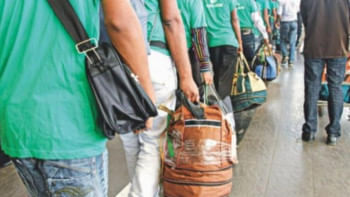There should be reconciliation among parties

German Ambassador to Bangladesh Achim Tröster has advocated for reconciliation between and within the political parties for a peaceful transition to democracy.
"This is an idea that has worked well in the recent past in countries like South Africa or Rwanda, but equally in Europe. I don't see any reason why this should not be the case in Bangladesh and contribute to a much better communal life," he said at an event marking the German Unity Day at the Franco-German Embassy in the capital Monday evening.
The comment comes as the interim government has undertaken various reforms following the fall of Awami League regime on August 5 amid a mass uprising. Political rivalries, lack of democratic practices, and accountability created a wide array of problems over the years.
The envoy said large parts of the society in Bangladesh were willing to assume enormous personal sacrifices, up to the ultimate, for freedom, participatory democracy, and more prosperity for all, not a few.
For their aspirations and dreams to come true, many citizens of Bangladesh feel that it needs a different approach in some areas, and he is convinced by the idea that a peaceful future of this country requires reconciliation.
Tröster said Germany and France, who were enemies for centuries, decided that reconciliation is the way forward towards a peaceful existence of their peoples and a necessary precondition for their aspirations for a free, peaceful, and prosperous Europe.
"What it needs is to change one's mind and to cast away the shadows of a bloody and revengeful past. In order to achieve reconciliation, we need to hear the word sorry and an apology for the crimes and mistakes that have been committed. I may be wrong, but so far, I unfortunately have not heard it here."
Furthermore, reconciliation is not possible without investigating and acknowledging the truth, Tröster said, appreciated the initiative of proper investigation into the events of July and August 2024, with the support of the UN Human Rights Office where Germany has contributed 50,000 Euros.
Germany appreciates the interim government efforts to swiftly restore security and stability and the reform initiatives that have been started for example in the banking sector. It will allow the German businesspeople to intensify and broaden their business with Bangladesh.
The German government assumes that with the establishment of the interim government, the common basis for cooperation -- bilaterally as well as in the framework of its cooperation with the European Union -- has broadened.
"We now share more democratic values and convictions than has been the case before, and we are hopeful of jointly making the best of it, to grasp this chance that has suddenly come about, for the benefit of the people of Bangladesh, for freedom, participatory democracy, and more prosperity for all and not only a few."
At the event, Commerce Adviser Salehuddin Ahmed sought support from all foreign countries for the interim government's institutional reform initiatives and also with finance on its journey towards new Bangladesh.


 For all latest news, follow The Daily Star's Google News channel.
For all latest news, follow The Daily Star's Google News channel. 








Comments